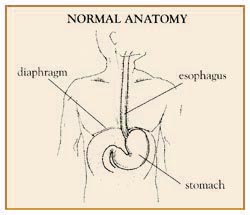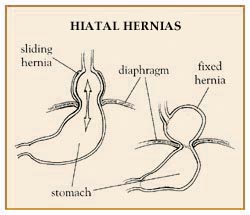Hiatal Hernia
The hiatal hernia is one of the most misunderstood and maligned conditions in medicine. People blame this hernia for much more than it ever does. Patients with a hiatal hernia need to understand what it is and what might occur with it. Most importantly, they need to know it is unusual for serious problems to develop from this type of hernia.
 Anatomy
Anatomy
The diaphragm is a sheet of muscle that separates the lungs from the abdomen. When a person takes a deep breath, the dome-shaped diaphragm contracts and flattens. In doing this, the diaphragm pulls air into the lungs. The left diaphragm contains a small hole through which passes the tube-shaped esophagus that carries food and liquid to the stomach. Normally this hole, called a hiatal, is small and fits snugly around the esophagus. The J-shaped stomach sits below the diaphragm.
What Causes a Hiatal Hernia?
In some people, the hiatal or hole in the diaphragm weakens and enlarges. It is not known why this occurs. It may be due to heredity, while in others it may be caused by obesity, exercises such as weightlifting, or straining at stool. Whatever the cause, a portion of the stomach herniated, or moves up, into the chest cavity through this enlarged hole. A hiatal hernia is now present. Hiatal hernias are very common, occurring in up to 60 percent of people by age 60.
What Are the Different Types of Hiatal Hernia?

- Sliding Hiatal Hernia-In this most common type of hiatal hernia, the herniated portion of thestomach slides back and forth, into and out of the chest. These hernias are normally small and usually cause no problems or even symptoms.
- Fixed Hiatal Hernia-In this case, the upper part of the stomach is caught up in the chest. Even with this hernia, there may be few symptoms. However, the potential for problems in the esophagus is increased.
- Complicated or Serious Hiatal Hernia--Fortunately, this type of hernia is uncommon. It includes a variety of patterns of herniation of the stomach, including cases in which the entire stomach moves up in the chest. There is a high likelihood that medical problems will occur with this hernia and that treatment, frequently involving surgery, will be required. Complicated hernias are uncommon.
Symptoms
In most patients, hiatal hernias cause no symptoms. This is especially true of sliding hernias. When symptoms occur, they may only be heartburn and regurgitation, when stomach acid refluxes back into the esophagus. Some patients with fixed hiatal hernias experience chronic reflux of acid into the esophagus, which may cause injury and bleeding. Anemia, or low red blood cell count can result. Further, chronic inflammation of the lower esophagus may produce scarring and narrowing in this area. This, in turn, makes swallowing difficult, and food does not pass easily into the stomach.
Does Hiatal Hernia Cause Pain and Indigestion?
It is wrong to always blame a hiatal hernia for pain and indigestion. Hiatal hernias generally do not cause acute pain. This symptom may result from other disorders, such as peptic ulcers or even heart disease. Some patients with coronary heart disease fool themselves into believing their discomfort is due to a hiatal hernia. If upper abdominal pain or indigestion occurs, people should not mislead themselves into thinking the cause is a hiatal hernia. Instead, the patient should seek medical advice.
Diagnosis
Diagnosis of a hiatal hernia is typically made through an upper GI barium x-ray. A complementary test is gastroscopy, or upper intestinal endoscopy, in which the physician visually examines the esophagus and stomach using a flexible scope while the patient is lightly sedated.
What Are the Complications?
The complications of hiatal hernia are:
- Chronic heartburn and inflammation of the lower esophagus, called reflux esophagitis.
- Anemia due to chronic bleeding from the lower esophagus.
- Scarring and narrowing of the lower esophagus causing difficulty in swallowing.
- While sleeping, stomach secretions can seep up the esophagus and into the lungs causing chronic cough, wheezing, and even pneumonia. In addition, the complicated hernia can cause serious problems such as difficulty in breathing or severe chest pain, especially in the elderly.
Treatment
Treatment is called for only when the hernia results in symptoms, such as persistent heartburn or difficulty in swallowing. Acid inflammation and ulceration of the lower esophagus also require treatment. General guidelines for treating heartburn and esophagitis (inflammation of the esophagus) are:
- Avoid (or use only in moderation) foods and substances that increase reflux of acid into the esophagus, such as: nicotine (cigarettes), chocolate, fatty foods, peppermint, alcohol, spearmint, and caffeine.
- Eat smaller, more frequent meals and do not eat within 2-3 hours of bedtime.
- Avoid bending, stooping, abdominal exercises, tight belts, and girdles all of which increase abdominal pressure and cause reflux.
- If overweight, lose weight. Obesity also increases abdominal pressure.
- Prescription medications. Certain drugs, such as intestinal antispasmodics, calcium channel blockers, and some antidepressants weaken the muscle strength of the lower esophagus. Elevate the head of the bed 8 to 10 inches by putting pillows or a wedge under the upper part of the mattress. Gravity then helps keep stomach acid out of the esophagus while sleeping.
Other Treatments
- Drugs - Some medicines effectively reduce the secretion of stomach acid, while others increase the muscle strength of the lower esophagus, thereby reducing acid reflux.
- Surgery - The complicated hiatal hernia requires surgery occasionally on an emergency basis. Surgery otherwise is reserved for those patients with complications that cannot be handled with medications. The mere presence of a hiatal hernia is not a reason for surgery.
Summary
A hiatal hernia is an extremely common condition which usually does not cause symptoms or problems. However, when it does, the physician can frequently treat the problem effectively with a well-planned program. Surgery is infrequently required to treat a hiatal hernia.
